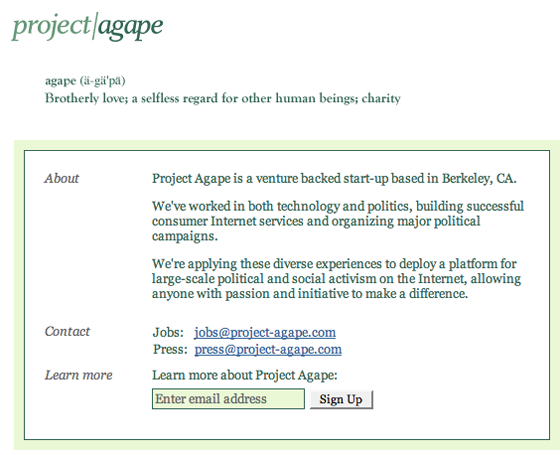Yesterday I sat down with Sean Parker at his offices at the Founders Fund in San Francisco to see a demo of his new and yet-to-be-named startup (the working name for the project is Project Agape).
Parker is a larger-than-life twenty seven year old who co-founded Napster and Plaxo and was the founding president of Facebook. He’s been working full time on Project Agape for the last eight months, while still putting in the hours at Founders Fund as a Managing Partner.
Parker knows about how to apply viral principles to ideas. Half of our 1.5 hour meeting was spent discussing these principles and how to fine tune ideas to the point where they can grow exponentially. The only thing that can stop a good viral idea is when it runs out of population, he says. If Napster, Plaxo and Facebook are any example, he just might be right.
Project Agape is still under a heavy cloak of secrecy (Om Malik first got wind of the new venture a week and a half ago), although I was able to see a demo and some additional conceptual work. Parker’s goal, he says, is to apply the same ideas around virality that worked so well on his previous projects to the idea of altruism and activism.
Charities, political parties and affinity groups all rely on participation from people who share the same beliefs and ideals. But recruiting and fundraising are largely stuck in the pre-Internet era: social pressure and guilt are applied to get others to donate to that marathon for the Leukemia society, or donate time working with the homeless. Parker wants to harness those proven incentive structures use his new startup to increase their effectiveness.
New sites like Change.org and dotherightthing and Six Degrees help people talk about issues online, but they don’t go far enough in using virality to get new users and get them actually doing things. Parker wants the kind of activity around these organizations that Facebook sees – tens of thousands of new daily users and hours and hours of social interactions. The result, he says, will be a much more efficient engine for organizations to get volunteers and raise money.
The company is based in Berkeley and will make some announcements in the coming weeks, and a beta product will be available in a couple of months. Stay tuned for more.
